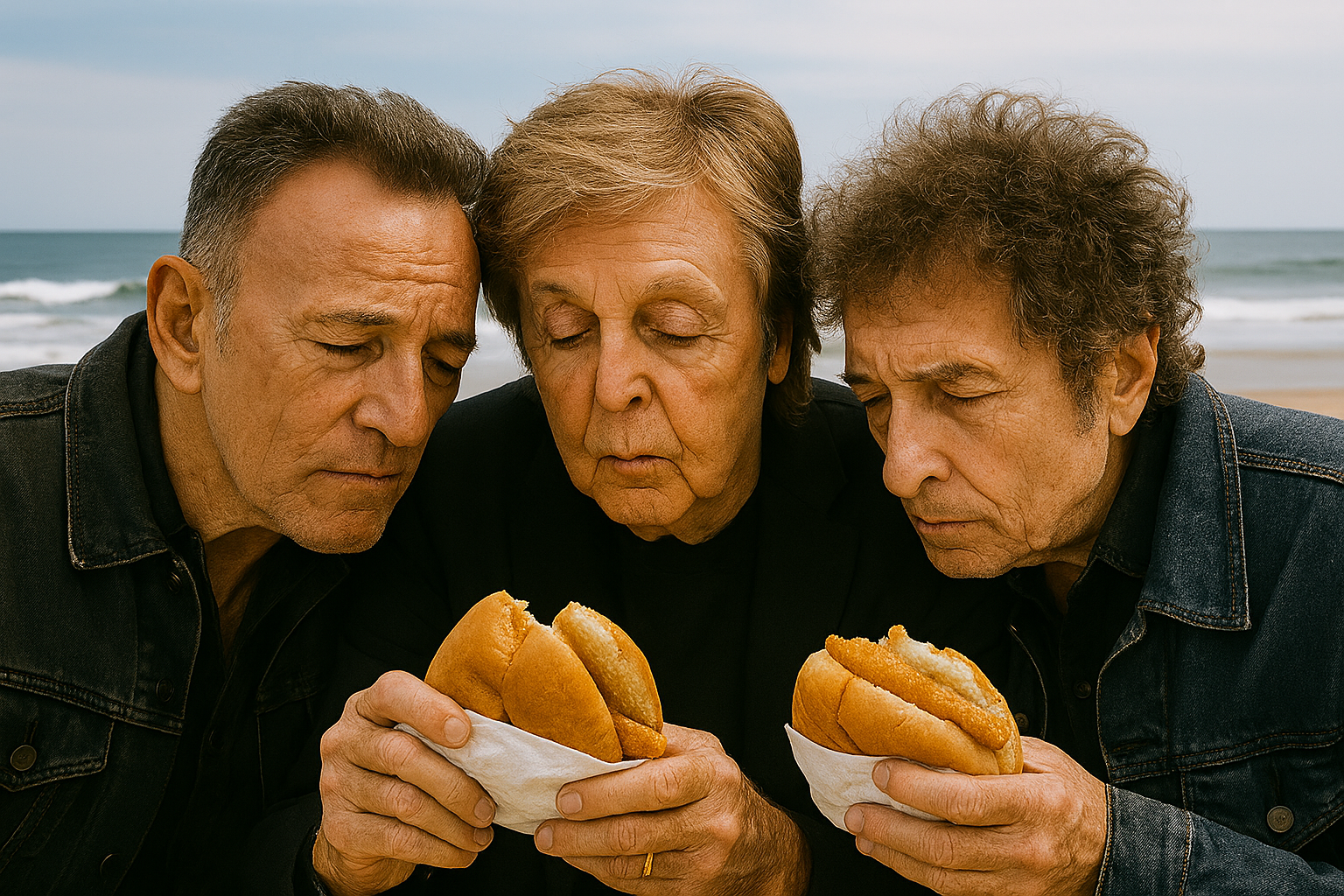The ocean mist was thick that afternoon in Asbury Park, softening the sky into a blur and turning memories into something almost touchable. Bruce Springsteen, dressed in a faded denim jacket and scuffed boots, stood silently before a weathered bench facing the Atlantic. He turned to Paul McCartney and Bob Dylan, who walked slowly behind him, and said, “This is it. Right here’s where I wrote Born to Run. Sand in my shoes, no money in my pocket.”
The three legends sat down together, holding fish sandwiches wrapped in wax paper—Bruce’s idea, a nod to old boardwalk tradition. They didn’t speak at first. They just watched the waves roll in like verses without melody, letting the stillness speak for them. Bob Dylan finally broke the silence. “Newport,” he muttered. “I still remember the boos. Not the cheers—those faded. But the boos stuck.” Paul smiled gently and replied, “You plugged in and set the world on fire. We all needed that.” Bob shrugged. “I needed it too. Otherwise, I would’ve drifted out like the tide.”

A seagull called overhead, the wind picking up slightly. Then Paul leaned back, eyes glinting with memory. “Lennon laughed at me once, first time ever,” he said. “1957, a church hall in Liverpool. I played him a song with a broken string. He didn’t say anything—just laughed like I’d told the best joke in England. That laugh… that was the real start of the Beatles.”
Bruce looked down at his hands. “I almost quit in ’82,” he admitted. “Tunnel of Love hadn’t been written yet. I felt burned out. Didn’t believe in the music anymore. I’d look in the mirror and wonder, ‘Is this all there is?’” Bob raised an eyebrow and said quietly, “And yet here you are.” Bruce nodded. “Yeah. Because I picked up my guitar again. And it answered back.”
For a while, they sat in silence, just chewing slowly, taking in the sound of waves and the creaking of the boardwalk behind them. Time passed gently, and a family wandered by, the father doing a double take—but choosing not to interrupt. Bruce eventually pulled out a tiny pocketknife—the kind with a pencil sharpener blade. “You ever sign something,” he asked, “not for fame, but so a piece of you stays behind?”
He handed it to Dylan, who carved his real name—Robert. Paul followed with Paul M. Bruce added the last, just Bruce. No words were spoken as they stood, gave the ocean one last look, and quietly walked away.
Two months later, city workers arrived at the bench. A quiet, unsigned letter had asked for a small glass canopy to be built over it. When the crew found the carvings, they didn’t ask questions. They just honored it. Beneath the glass, a small plaque was placed that read: “For the Words That Never Left.”
Since then, people have come from all over. Songwriters sit on the sand nearby, scribbling in notebooks. Fans leave vinyl records like offerings. Children run past, unaware of the magic in the air but feeling something just the same. Some say that on foggy mornings, if you sit still enough, you can hear it: the low hum of a guitar, the cry of a harmonica, or a soft Liverpool voice telling a story.
Maybe it’s just a legend. But the bench is real. The names are real. And somewhere between the sea and the sky, the music still plays.
